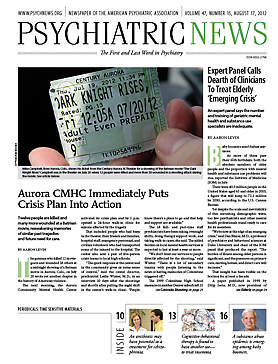Certification Language Matters
The April 20 issue contains an article about the Maintenance of Certification (MOC) Program written by leaders of the American Board of Psychiatry and Neurology (“ABPN Leaders Explain Goals, Background of MOC Program”), which contains some disturbing information.
The article states, “Lifetime certificate holders who do not participate in the MOC Program will be listed as ‘Certified but Not Meeting MOC Requirements.’ ” In my opinion, that phrase has the potential to stigmatize psychiatrists who have chosen not to pursue MOC.
The article does explain that “[t]here will be a special note that meeting MOC requirements is not mandatory for lifetime certificate holders.” However, I do not believe this additional note will soften the reaction of a patient or attorney who has already read the stigmatizing phrase “Certified but Not Meeting MOC Requirements.” The word “but” suggests something less than full certification.
Certainly, lifetime certificate holders who choose to participate in the MOC Program should be recognized. I propose that the ABPN consider a system in which lifetime members who pursue MOC would be recognized without stigmatizing those who do not. Instead of using the proposed language, the ABPN could list lifetime members as either “Certified” or “Certified and Meeting MOC requirements.”
The special note, explaining that meeting MOC requirements is not mandatory, could still be included and in this context would emphasize the additional efforts of those who pursue MOC without stigmatizing those who choose not to do so.
Jeffrey Weiner, M.D.San Mateo, Calif.
Response from Mary Helen Davis, M.D., chair of the APA Board of Trustees Work Group on Maintenance of Certification:
Dr. Jeffrey Weiner must be a seasoned psychotherapist given his response to the recent Maintenance of Certification Program article; as such, he understands the value of words and the power of stigmatization and of stating accomplishments in the positive versus use of prepositions that qualify the value of one’s certification. His offered solution seems reasonable and logical, at least as a temporary salve to those of us who have grandfathered status and ambivalence about the MOC process.
Unfortunately many of us in the practice of psychiatry have been siloed from the regulatory changes that have faced the rest of medicine and are now knocking on our door. This change is global, from maintenance of licensure to institutional accreditations; the practice of medicine is evolving, and regulatory mandates are following on the heels of this change. Certification has become a track-and-field event; every time you clear the bar, it is raised. Failure to attempt the jump or clear the bar will ultimately have consequences down the road. The gamble is on how long and how far down the road those consequences might impact one’s practice. Having followed health care policy and trends, I can say that, for better or worse, the pace of change is accelerating and perhaps the best time to change is prior to being forced.
Nonetheless, if my assumption is accurate and Dr. Weiner is a seasoned psychotherapist, he will have plenty of job security treating physicians across multiple specialties for demoralization as they adapt or choose not to adapt to the myriad changes coming down the health care trend track.
Response from James R. (Bob) Batterson, M.D., chair of the Assembly Committee on Maintenance of Certification:
Dr. Weiner’s letter highlights the concerns of many APA members about changes coming from the ABPN. From the earliest announcement of the new MOC Program with Performance in Practice (PIP) guidelines, APA’s Assembly has been discussing the problems that will likely be encountered, and action papers have been written on the topic. During APA’s 2012 annual meeting, the Assembly voted that the ABPN be asked to delay implementation of the PIP portion of MOC to allow more time to gather scientific evidence showing that it would improve quality of care. Due to the reporting requirements that the American Board of Medical Specialties places on the ABPN regarding physician participation in MOC, it seems likely that the reporting of whether we are or are not meeting MOC requirements will be implemented. Dr. Weiner’s suggestion of a way to do this that respects the lifetime certification while still being able to report participation in MOC deserves serious consideration by the ABPN. Perhaps the ABPN can look for guidance from other medical boards, such as the American Board of Pediatrics, where there is a statement of certification or not, year certified, and the MOC requirements currently being met or not. The ABPN could use the term “Lifetime Certified” or “Certified.” I hope that Dr. Weiner will contact his Assembly representative and suggest an action paper for the November Assembly meeting.
